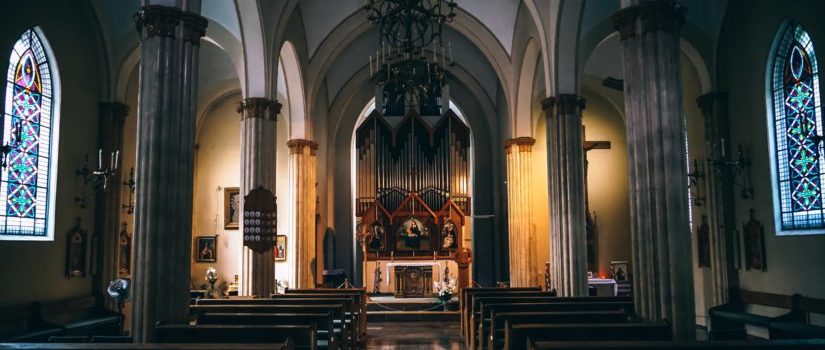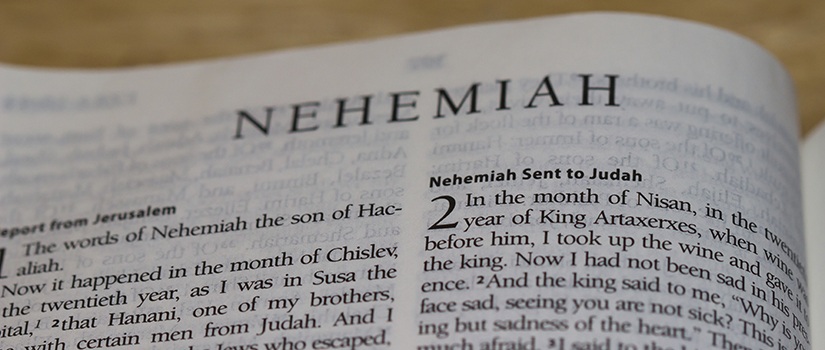How To Measure A Church
I Thessalonians 1:1-10
Where ever the apostle Paul went he either started a revival or a riot chand most of the time it was both. As soon as the church at Philippi was founded a riot ensued by those who were opposed to the kingdom of God. A talented businesswoman Lydia and her household were saved along with the jailor and his family. No doubt the servants of Lydia were also saved at the preaching of the Gospel. After Paul and Silas were thrown in jail the city magistrates came and “kept begging them to leave the city” (Acts 16:39). Paul and his team went to the home of Lydia after being released from prison and “encouraged” these new believers (v. 40). Then he traveled a hundred miles to neighboring town and arrived in the city of Thessalonica where there was a synagogue of the Jews (17:1).
This ancient city was located on the great Roman road that went from the Adriatic Sea to the Middle East called the Via Egnatia or Egnatian Way. The main street of city of Thessalonica was actually part of that road. The city was blessed with hot springs that attracted tourist and the famous harbor was the base for Xerxes. In 315 B.C. the Macedonian king Cassander rebuilt the city and named it Thessalonica after his wife who was a half-sister to Alexander the Great. Rome annexed Macedonia in 167 B.C. and then gave her the status of a “free city” in 42 B.C. with many privileges provided by the Roman government. The Romans used its great dockyards. The population rose to 200,000 during Paul’s time. Today, Salonika has a population of 70,000 and resides on the same foundation as old Thessalonica. It is a bustling city of commerce in northern Greece and is one of the few New Testament cities still flourishing. The ancient city gate through which Paul entered the city is still standing.
There was a sizable Jewish population there and it was Paul’s custom when he arrived in a new city to go to the synagogue of the Jews. We know that Paul was in Thessalonica at least three weeks before riots broke out. Dr. Luke tells us, that Paul “for three Sabbaths reasoned with them from the Scriptures, explaining and giving evidence that the Christ had to suffer and rise again from the dead, and saying, ‘This Jesus whom I am proclaiming to you is the Christ.’ And some of them were persuaded and joined Paul and Silas, along with a large number of the God-fearing Greeks and a number of the leading women” (17:2-4).
God used Paul to start a new church in “the lap of the Roman Empire.” However, sometime after the foundations were laid “the Jews, becoming jealous and taking along some wicked men from the marketplace, formed a mob and set the city in an uproar; and attacking the house of Jason, they were seeking to bring them out to the people. When they did not find them, they began dragging Jason and some brethren before the city authorities, shouting, “These men who have upset the world have come here also; and Jason has welcomed them, and they all act contrary to the decrees of Caesar, saying that there is another king, Jesus.” The persecutors persisted in stirring up the crowd and the city authorities. Jason had to put up a bond so the magistrates would release Jason and some believers. The result was “The brethren immediately sent Paul and Silas away by night to Berea,” which was 60 miles west of Thessalonica. Luke tells us, “when they arrived, they went into the synagogue of the Jews” and found the people of Berea were “more noble-minded” and “received the word with great eagerness, examining the Scriptures daily, to see whether these things were so” (v. 10-11). The result was another church was started in a Greek city. “But when the Jews of Thessalonica found out that the word of God had been proclaimed by Paul in Berea also, they came there as well, agitating and stirring up the crowds. Then immediately the brethren sent Paul out to go as far as the sea; and Silas and Timothy remained there” (vv. 13-14). Paul went on alone to Athens, where he remained for a short time, and from there to Corinth. It was from the city of Corinth that Paul wrote his first letter six months to a year later to these new believers under the fire of persecution in Thessalonica.
What would you have written to new believers who are being hunted down like wild animals and harassed for their faith in Jesus Christ? We have a copy of that letter Paul wrote in our possession today. Turn with me over to 1 Thessalonians 1:1 and let’s see what he said to them. Ancient letters opened like our modern day memos. From
Paul and Silvanus and Timothy, To the church of the Thessalonians in God the Father and the Lord Jesus Christ: Grace to you and peace. We give thanks to God always for all of you, making mention of you in our prayers; constantly bearing in mind your work of faith and labor of love and steadfastness of hope in our Lord Jesus Christ in the presence of our God and Father, knowing, brethren beloved by God, His choice of you; for our gospel did not come to you in word only, but also in power and in the Holy Spirit and with full conviction; just as you know what kind of men we proved to be among you for your sake (1:1-5).
In these opening verses we immediately hear a prayer filled with thanksgiving and words of encouragement to this new church. Paul began with a burst of praise and thanksgiving to God.
In this first chapter we find the characteristics of not only mature believers, but also a mature church. Paul is constantly reminding us in his letters of these three characteristics of those who are in Christ. He begins with words of praise regarding their “work of faith” in Christ. Faith is the assurance that God has acted for His people by sending His Son Jesus Christ to gain their salvation through His death and resurrection. It is an abiding trust in God. The “labor of love” is the continuing relationship we have with God through Jesus Christ. Moreover, the “steadfastness of hope” is the conviction that all God began in us when we believed on Christ as our Savior will be completed the day we meet Him face to face in glory at His coming. Let’s examine our hearts as we observe these three qualities in the maturation process.
PAUL REMINDS THEM OF THEIR WORK OF FAITH IN CHRIST (1:1-5, 9)
The Thessalonians have a living, dynamic faith that works. It demonstrated itself in daily life.
We are saved by grace through faith. All that is necessary for our salvation has been done for us by the work of God in Christ on the cross. We are not saved by works, but we are saved for works, specifically “the good works, which God prepared in advance for us to do” (Ephesians 2:10). We receive salvation, regeneration, and the remission of our sins by trusting in Christ as our Savior and by following acts 2:38
Acts 2:38 (KJV) Then Peter said unto them, Repent, and be baptized every one of you in the name of Jesus Christ for the remission of sins, and ye shall receive the gift of the Holy Ghost.
Paul thanks God for the confidence and trust they have in Jesus Christ. He was giving thanks for all of them (v. 2). No particular group was being singled out in the church. “We give thanks to God always for all of you, making mention of you in our prayers.”
These new believers were pagans who have been saved by grace alone through faith alone in Christ alone. Because of that grace they have come to experience “peace” with God.
They have this peace because are “in God the Father and the Lord Jesus Christ” (v. 1). These believers have two addresses. They have one in the city of Thessalonica and they have one “in God the Father and the Lord Jesus Christ.” “Christians are not simply people who have heard about God and trust Him,” writes Leon Morris. “They live ‘in’ Him day by day. All their deeds are done in Him. It is Paul’s usual habit to speak of being ‘in Christ,’ though ‘in God’ occurs, as in Col. 3:3. But throughout these two Epistles, he constantly associates the Father and the Son in the closest of fashions (cf. v.3; 3:11-13; 5:18; II Thess. 1:1, 2, 8, 12; 2:16f; 3:5 . . . No higher view could possibly be taken of the Person of Christ.”
Therefore, Paul can “give thanks to God always for all of you, making mention of you in our prayers . . .” What comes to Paul’s mind when he thinks of the new believers? He tells us in verse three. We are “constantly bearing in mind your work of faith and labor of love and steadfastness of hope in our Lord Jesus Christ in the presence of our God and Father . . . ” Their faith in Jesus Christ had changed their lives. They had “turned to God from idols to serve a living and true God” (v. 9).
They turned to God
It began with God’s election of these Thessalonians. God chose them. “Knowing, brethren beloved by God, His choice of you (v. 4).” The election is entirely an expression of God’s love. Everything in our Christina life begins with God’s love and His election of us. Believers are the elect of God because He chose them before they chose Him. “For God so loved the world, that He gave His only begotten Son, that whoever believes in Him shall not perish, but have eternal life. For God did not send the Son into the world to judge the world, but that the world might be saved through Him” (John 3:16-17).
How did Paul know that God chose them? Because there came a time in their lives when Paul and company arrived in Thessalonica and they heard the Gospel preached to them. Paul declared the truth of God’s Word to them. Paul says, “our Gospel came to you in the word.” The simple, straightforward preaching of God’s word awakened in them the fact of sin and salvation through Jesus Christ. When they heard the Good News they were drawn to God and the Holy Spirit brought them to a deep sense of conviction in their hearts. “No one can come to Me unless the Father who sent Me draws him; and I will raise him up on the last day” (John 6:44). When you sense the Holy Spirit’s tugging at your heart and you have interest in the things of God that is God at work bringing you to Himself. The Thessalonians responded to the Holy Spirit, therefore revealing that God had elected them. That is the way He works in our hearts, too. If during the message, you have a strange feeling of conviction regarding sin, judgment and the righteousness of God, that is His Spirit drawing you to repentance and faith in Christ. Heed His presence. That is the evidence that “He chose us in Him before the foundation of the world” (Ephesians 1:4).
F. F. Bruce writes, “They knew that the Thessalonian believers are truly among the elect of God because the unmistakable signs of the new life have become apparent in them, including their ready response to the gospel––a vital as well as a verbal response. . . . They are chosen ‘in Christ’––by faith-union with him who is the elect one of God par excellence––whether they are Jews or Gentiles.” Then he adds with clarity:
The choosing and the calling are alike the act of God: He chose his people in Christ “before the world’s foundation:” (Eph. 1:4) and called them in time (cf. 2 Thess. 2:13, 14) in order that they might reproduce His character by being “conformed to the image of His Son” (Rom. 8:29). While the act of election took place in God’s eternal counsel, its effects are seen in the lives of the elect, as they were seen now in the lives of the Thessalonian Churches (1 & 2 Thessalonians, p. 13).
God elected them and they responded to His calling them to salvation. Paul reminds them, “for our gospel did not come to you in word only, but also in power and in the Holy Spirit and with full conviction . . . ” (v. 5a). The gospel is always relevant when it comes in the power of the Holy Spirit. When Christ came into their lives they were changed, people.
The preaching was accompanied by the “full measure” of the power of the Holy Spirit. It was not simply an emotional experience that swept them off their feet by great oratory ability. This was the unmistakable power of the Holy Spirit at work in their hearts.
The gospel came in the power of the Holy Spirit. No one can be saved unless the Holy Spirit works in our minds and hearts. We must be “born again.” Regeneration must take place in our hearts. We need a spiritual birth and only the Holy Spirit can do that. The “gospel” came “with power and the Holy Spirit and with full conviction.” The Holy Spirit’s operation in their hearts caused them to act upon the truth and they believed on Christ. They yielded or gave their lives to Christ. He gripped their minds, warmed their hearts and changed their wills. It began with their election by God and was completed by their simple faith in Christ. This is the only way you can turn “to God from idols to serve a living and true God” (v. 9). He alone lives and is therefore alone the real God.
That indeed is a work of faith. It is a miracle. God does it. There are therefore unmistakable signs of new life in these new believers. It can be seen in their turning to God from idols. A true faith produces works. It is not lifeless. It is a driving force in the heart of the true believer.
The Holy Spirit of God is the deep conviction in their souls. God had a purpose for them and He is going to bring it to pass. We know they were elected of God because they “welcomed the message with the joy given them by the Holy Spirit.” If they were not the elect of God they would have rejected the Holy Spirit and still be bound to their idols.
From idols
Our modern day world is one of the most idolatrous in human history. We are surrounded by false worship. We worship the great god of Self. Jesus said, “‘No servant can serve two masters; for either he will hate the one and love the other, or else he will be devoted to one and despise the other. You cannot serve God and wealth.’ Now the Pharisees, who were lovers of money, were listening to all these things and were scoffing at Him. And He said to them, ‘You are those who justify yourselves in the sight of men, but God knows your hearts; for that which is highly esteemed among men is detestable in the sight of God'” (Luke 16:13-15). What is it we worship in America? Beauty, intellectual, wealth, family heritage, positions. We sit at the feet of appearance, performance, and status. There is nothing wrong with money, intelligence, beauty, and family values and status. The problem is how we use them to fill the vacuum of our souls. We bow down to them and they control our lives. They become our masters instead of Christ being our master.
Americans bow down to Baal every night at prime time. It is exported to the rest of the world. Baal was the erotic deity associated with fertility cults in the ancient religions. It is filled with some of the most loathsome practices of sexual perversions which are promoted as acceptable lifestyles.
We need the same miracle in our day as occurred with the Thessalonians. Many of you have experienced that. You know what Paul is saying about the Thessalonians is true because you have also experienced the same marvelous change that comes through God’s marvelous grace.
When you put your faith in Christ as your savior it is a “work of faith.” Paul is not saying works saves us because Christ alone saves us. We receive it by faith by obedience to Gods word. We must believe in God and who He is that His name is Jesus, we must be baptised in Jesus name for the remission of sins to wash away our sins, and we must be baptized in the Holy Ghost and endure at the end.
The Thessalonians turned to God from idols to serve the living and true God. This was not reformation or a social gospel, but faith in Christ first that resulted in idols being forsaken. It was a single, deliberate, decisive choice. They chose to turn once for all to God from idols.
Have you put your faith and trust in Jesus Christ alone to save you? You will know the election of God by the evidence of the transforming work of grace manifested in your life. If you have trusted in Him and obeys his plan of salvation given in acts then you know and have experienced the love of Christ.
PAUL REMINDS THEM OF THEIR LABOR OF LOVE FOR CHRIST (1:5b-8)
One of the characteristics Paul uses to describe the church at Thessalonica is the love that exists between the church and her Lord. This love is the manifestation of Christ-like behavior in the body of Christ and the community.
What is this love at work? Paul tells us in the following verses. He writes to them:
. . . You know what kind of men we proved to be among you for your sake. You also became imitators of us and of the Lord, having received the word in much tribulation with the joy of the Holy Spirit, so that you became an example to all the believers in Macedonia and in Achaia. For the word of the Lord has sounded forth from you, not only in Macedonia and Achaia, but also in every place your faith toward God has gone forth so that we have no need to say anything” (vv. 5b-8).
Paul was proud of those new converts. They were living above the chances, changes, and circumstances in their lives. They were remaining faithful their first love.
There was much to discourage their newfound faith. They came to faith during “much tribulation.” They had gone through the same kind of treatment that Paul received in Thessalonica. He reminds them “for you also endured the same sufferings at the hands of your own countrymen, even as they did from the Jews . . . who drove us out. They are not pleasing to God, but hostile to all men.” (2:14-15). The Holy Spirit gave them joy in the midst of their suffering. The word for tribulation comes from a word meaning to press hard upon. They had been pressured by their own people and the Jews and they remained faithful “with the joy of the Holy Spirit.”
The same thing happens in our lives when we stop complaining and start rejoicing in Christ. He takes the changes, chances, and circumstances in our lives and uses them to demonstrate His faithfulness to us. He uses them to open doors so He can minister through us to others who are hurting. When we rejoice in Christ while enduring the pressures of life we demonstrate our love for Him. No one can argue with a changed life. The result is they “became an example to all the believers in Macedonia and in Achaia” (v. 7). These new believers in a short time had watched and observed Paul and his companions attitudes and behaviors and “became imitators” of their love and their faith (vv. 5b-6a).
These new believers became models of the behavior that was modeled before them by the apostle Paul and his coworkers. They received it in spite of persecution and affliction with the joy of the Holy Spirit. There was evidence of the work of the Holy Spirit in their hearts because of the unspeakable joy in spite of suffering persecution.
Their labor of love reached out to their neighbors (v. 8-9). “For the word of the Lord has sounded forth from you, not only in Macedonia and Achaia, but also in every place your faith toward God has gone forth, so that we have no need to say anything. For they themselves report about us what kind of a reception we had with you, and how you turned to God from idols to serve a living and true God . . . ” They have now become models for other believers. The gospel has “sounded forth from you . . . in Macedonian and Achaia.” It has been like a trumpet or the roll of thunder. The message has gone forth into other provinces because of their love for the Savior. These Thessalonians were preaching the word, and the testimony of their faith in God was spread everywhere they went. The word has come full circle. Paul has received word from other Christians about the love for the gospel these Thessalonians have. “They themselves report about us what kind of a reception we had with you, and how you turned to God from idols to serve a living and true God.” These new believers at Thessalonica are acting on their new faith. They are telling other people about Christ and what He has done in their lives. They are changed people and they are acting on their new values. They simply shared with their neighbors what God had done in their lives and the word went up and down the Egnatian Way to other provinces in the Roman Empire. “Their faith has gone forth everywhere.” It is a labor of love. Wherever the apostle Paul went, people would tell him about the changes they saw in people’s lives in Thessalonica.
That is the way God continues to work to change this world. When you fall in love with Jesus you want the whole world to know Him. You cannot help but take the Gospel out of the realm of self–edification and share it with others. It is a “labor of love.”
Not only was Paul thankful for the Thessalonian church’s “work of faith” and “labor of love,” but also their “steadfastness of hope.” In spite of the circumstances they had an awareness of God and that He was in control.
PAUL REMINDS THEM OF THEIR STEADFAST HOPE IN CHRIST (1:10)
Every chapter in both Thessalonian letters mentions the hope in the second coming of Jesus Christ. These Thessalonians have a living hope in the “living and true God,” and therefore they “wait for His Son from heaven, whom He raised from the dead, that is Jesus, who delivers us from the wrath to come” (v. 10). The word for “to wait” for His Son from heaven is in the present tense expressing being always on the watch for Christ’s return. When a person has hope he has doctrinal insight and stability. He is able to bring together our present and future relationship to God through Jesus Christ. A mature person has hope for the future with a sovereign God. These believers had turned to God in one decisive act, but there remained the constant, day-by-day expectation of His return. They were constantly looking for the return of the Lord Jesus for His saints.
John Walvoord has an excellent outline on the theme of the coming of the Lord in 1 Thessalonians:
The first chapter unfolds the great theme of the Lord’s coming in relations to salvation. In Chapter 2 the Lord’s coming in relation to Christian service is presented. Chapter 3 relates sanctification to the Lord’s coming. In Chapter 4 the Lord’s coming is revealed as the surety of resurrection of our loved ones who have died in Christ. Chapter 5, which concludes the Epistle, deals with the safety of the believer in the days of the wrath of God preceding the second coming of Christ. Throughout the epistle the theme of the coming of the Lord is related to practical Christian living (Thessalonians, p. 8)
They believed that the living Jesus whom God raised from the dead was coming again from heaven. The angel has told the disciples who watched Jesus ascend into heaven, ” Men of Galilee, why do you stand to look into the sky? This Jesus, who has been taken up from you into heaven, will come in just the same way as you have watched Him go into heaven” (Acts 1:11). This was the hope of these new believers.
Paul will remind them later in this letter that when we die we go into the presence of Christ. He has gone to prepare a place for us. Because He lives, we too shall live. Christ is alive! Our loved ones who have died in Christ are alive right now in heaven. They are with Christ. They are coming back with Him when He returns.
Note carefully that Paul says Christ is alive. We wait for the savior from heaven, whom God “raised from the dead, this is Jesus.” Our hope is in Him. It is in the living Jesus who is alive right now.
Paul goes on to remind them that this same Jesus is the one who “delivers us from the wrath to come” (v. 10). Jesus delivered all who would trust in Him and receive Him as their Savior. Christ died for them. They were delivered from the coming wrath. Have you been delivered? Have you put your trust in Christ?
What a blessed hope. Thank God, He has delivered us from that day of wrath.
Wrath is coming! There is a Day of Judgment coming. Have you been “rescued” from the wrath of God? (Romans 1:18; 1 Thessalonians 2:16; 5:9). I am quite aware that this is not popular preaching in our day. We are supposed to be tolerant of everyone’s feelings. But I cannot stand before God and be true to Him without warning you of the truth. Regardless of who you are, there is a Day of Judgment coming when every person must stand before a righteous and holy God who will not tolerate sin or unbelief. He compassionately calls to everyone now while there is still an opportunity to turn to Him. He does not want to see anyone perish. That is why He sent His Son, Jesus Christ to die for you. “For God has not destined us for wrath, but for obtaining salvation through our Lord Jesus Christ” (5:9). I plead and beg with you to turn to Christ right now and believe on Him as your Savior.
Let’s go back and ask our original question, how do you measure a church? When is a local fellowship of believers a mature church? How do you determine when a local body becomes a mature body?
Gene Getz makes this observation that is well worth our consideration.
There will be activity! Normally, the church will be growing numerically! People will be sharing their material possessions! People will be leading others to Jesus Christ and support missions! The church will be well organized! There will be a sense of enthusiasm and excitement. And certainly, there may be a number of ministries that develops out of a dynamic New Testament church!
But unfortunately, all of these things can be present without having a mature church. When measured by biblical criteria a church may be found seriously wanting in spite of all activity, busyness, and organizational structure.
It is clear from Paul’s letters to various New Testament churches that the thing that pleased him, the thing that he thanked God for, again and again, was what he heard about the development of faith, hope, and love––but especially love. . . he would even hold up certain churches that had developed these marks of maturity as examples to others churches (pp. 17-19).
It is easy to emphasize good things but not the most important things. It is very comfortable to seek what is good and fail to seize the best. If love is the most important thing, how do we measure up? What steps will we take to grow in love?
“Maturity in a body of believers is not a constant. Neither does it always progress.” It goes up and down and it can even regress. We can be strong in some areas and weak in others. Let’s take a few moments and ask ourselves where we are in our faith, hope, and love. What is your greatest area of strength? What do you talk about the most with positive expressions? What is the strongest area in our church? Are these strengths related to faith, hope, and love or to some peripheral?
: “‘What does God see in our hearts?’ A real trust in Him? A real love for Him? A real hope for that which is a part of our Christian life? Paul saw the outward evidence in these things, but God looks at the heart.”
God bless
sister Phyllis









